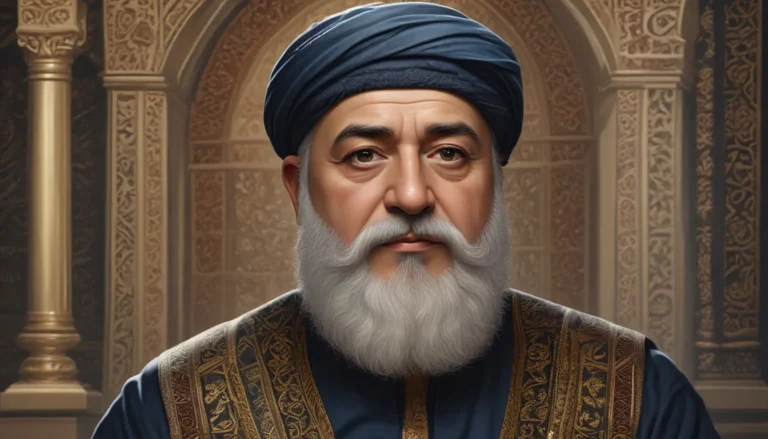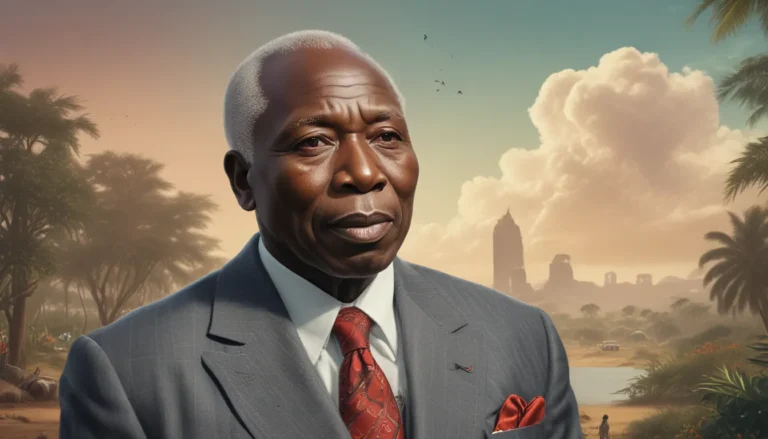The images in our articles may not match the content exactly. They are used to grab your attention, not to show the exact details in the text. The images complement the text but do not replace it.
Welcome to the world of Edward Said, a prominent intellectual figure whose impact transcended boundaries. From his groundbreaking work on Orientalism to his unwavering advocacy for social justice, Edward Said’s life and career were nothing short of remarkable. In this article, we delve into 15 surprising facts about Edward Said, offering a fresh perspective on his enduring legacy and multifaceted contributions to academia. Join us on this journey of discovery as we uncover the lesser-known aspects of this influential scholar’s life.
Discovering Edward Said: A Journey through History and Culture
1. Edward Said’s Birthplace and Connection to Palestine
Born on November 1, 1935, in Jerusalem under British mandate, Edward Wadie Said’s upbringing in Palestine laid the foundation for his deep commitment to challenging Western narratives of the Middle East. His birthplace played a crucial role in shaping his identity and advocacy for social justice.
2. Multilingualism: A Testament to Intellectual Prowess
An extraordinary facet of Edward Said’s intellect was his fluency in multiple languages. Proficient in English, Arabic, French, and German, Said’s linguistic abilities allowed him to engage with diverse literary and cultural traditions, showcasing the breadth of his knowledge and understanding.
3. The Seminal Work: “Orientalism”
Edward Said’s groundbreaking book “Orientalism,” published in 1978, revolutionized the study of Western representations of the East. By critically analyzing prevailing stereotypes and exposing power dynamics, Said challenged the Western understanding of the “Orient” and paved the way for a more nuanced perspective.
4. Academic Eminence: Professor of English and Comparative Literature
Throughout his career, Edward Said held esteemed teaching positions at Columbia University and the University of California, Berkeley, where he imparted his insightful analysis and impassioned advocacy for justice to countless students. His academic contributions left an indelible mark on the intellectual landscape.
5. Harmonies of the Heart: Edward Said the Musician
Beyond his scholarly pursuits, Edward Said was a gifted pianist who found solace and inspiration in music. His love for classical composers such as Beethoven and Wagner resonated throughout his life, reflecting a harmonious blend of intellectual pursuits and artistic expression.
Unraveling the Layers: Personal Experiences and Advocacy
6. Founding the Palestinian National Initiative
In 2002, Edward Said played a pivotal role in establishing the Palestinian National Initiative, a grassroots movement dedicated to seeking a peaceful and just resolution to the Israeli-Palestinian conflict. This initiative underscored Said’s enduring commitment to the Palestinian cause beyond academia.
7. Memoirs of Identity: “Out of Place”
Published in 1999, Said’s memoir “Out of Place” delved into his experiences of displacement and the complexities of growing up Palestinian in exile. Offering an intimate glimpse into his personal struggles, the memoir illuminated the formation of his intellectual and political perspectives.
8. Voice Against Injustice: Critique of US Foreign Policy
Throughout his career, Edward Said emerged as a vocal critic of US interventions, particularly in the Middle East. He highlighted how American foreign policy perpetuated harmful stereotypes and overlooked the intricate dynamics of the region, advocating for a more nuanced approach.
Embracing Humanism and Academic Freedom
9. The Power of Humanism: Bridging Cultural Divides
Edward Said championed humanism as a potent tool for fostering empathy, compassion, and knowledge to bridge cultural divides and promote understanding. By advocating for these values, Said emphasized the importance of challenging oppression and advancing justice.
10. Defender of Academic Freedom: A Scholar’s Stand
As a staunch advocate for academic freedom, Edward Said consistently emphasized the need to liberate intellectual spaces from political influence and censorship. He believed in fostering open and critical dialogue to cultivate a vibrant academic environment.
Recognition and Legacy: A Lasting Impact
11. Honors and Awards: Acknowledgment of Intellectual Contributions
Edward Said’s intellectual prowess garnered prestigious accolades during his lifetime, including the Lionel Trilling Book Award, the Lannan Literary Award for Lifetime Achievement, and the Prince of Asturias Award for Concord. These honors underscored the significance of his scholarly endeavors.
12. Public Intellectual: Engaging in Global Discourse
Edward Said actively participated in public discourse, offering insightful commentaries on issues ranging from cultural imperialism to the Israeli-Palestinian conflict. His fearless advocacy and articulate articulation resonated in global intellectual discussions, leaving an indelible impact.
Pioneering Change: Disrupting Academic Hegemony
13. Challenging Hegemonic Structures: A Scholar’s Quest
Edward Said’s work aimed to disrupt dominant Western narratives and challenge the hegemonic structures within academia. By interrogating established knowledge and power systems, Said paved the way for a more inclusive and diverse intellectual landscape.
14. Interdisciplinary Influence: Inspiring Diverse Fields
Edward Said’s ideas transcended disciplinary boundaries, inspiring writers, artists, and activists to critically examine the impact of imperialism, colonialism, and Orientalism on contemporary society. His enduring legacy continues to fuel debates on issues of identity, power, and representation.
15. Enduring Relevance: A Legacy That Transcends Time
Decades after his passing, Edward Said’s scholarship and activism retain their significance in shaping postcolonial studies, cultural criticism, and literary theory. His ideas continue to resonate as society grapples with complex issues of identity, power, and representation.
In a world shaped by Edward Said’s intellectual legacy, his ideas continue to provoke thought and inspire critical inquiry. As we delve into the life and work of this extraordinary scholar, we uncover a tapestry of insights that challenge our perceptions and broaden our understanding of the world. Edward Said’s enduring legacy serves as a poignant reminder of the importance of empathy, understanding, and the pursuit of social justice in our quest for a more equitable and inclusive society.
Exploring Further: FAQs on Edward Said
1. Who is Edward Said?
Edward Said was a Palestinian-American scholar, literary critic, and public intellectual known for his seminal work on Orientalism and his advocacy for social justice.
2. What are some of Edward Said’s notable works?
Edward Said’s notable works include “Orientalism,” “Culture and Imperialism,” “Covering Islam,” “The Question of Palestine,” and “Out of Place: A Memoir.”
3. What is the significance of “Orientalism”?
“Orientalism” critically examines Western representations of the East, challenging stereotypes and power dynamics in academic scholarship.
4. How did Edward Said contribute to postcolonial studies?
Edward Said revolutionized postcolonial studies by introducing new perspectives, questioning Eurocentric narratives, and emphasizing power dynamics and colonial legacies.
5. What is Edward Said’s impact on academia?
Edward Said’s ideas continue to influence academia, particularly in literature, cultural studies, and postcolonial theory, inspiring scholars to challenge established norms and discourses.
6. Has Edward Said received recognition for his contributions?
Yes, Edward Said received numerous awards and honors for his scholarly contributions, including the Lionel Trilling Book Award and the Presidential Medal of Freedom.
Embark on a journey of discovery as you delve into the profound legacy of Edward Said, a visionary scholar who dared to challenge conventional wisdom and disrupt hegemonic structures. Through his scholarly pursuits and unwavering commitment to justice, Edward Said continues to inspire generations of thinkers and activists striving for a more just and equitable world. Join us in celebrating the enduring legacy of this remarkable intellectual luminary, whose ideas continue to shape our understanding of culture, power, and representation.






